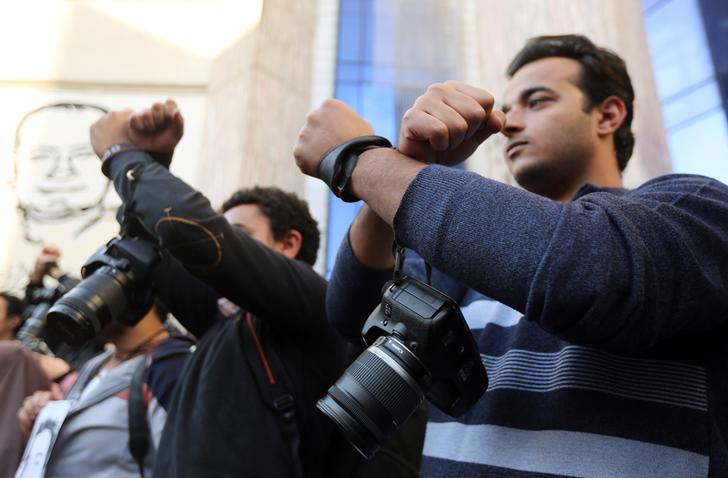Latest NEWS
- Aswat Masriya, the last word
- Roundup of Egypt's press headlines on March 15, 2017
- Roundup of Egypt's press headlines on March 14, 2017
- Former Egyptian President Hosni Mubarak to be released: lawyer
- Roundup of Egypt's press headlines on March 13, 2017
- Egypt's capital set to grow by half a million in 2017
- Egypt's wheat reserves to double with start of harvest -supply min
- Roundup of Egypt's press headlines on March 12, 2017
Publication bans in 2015, 13 cases of media coverage prohibitions

News photographers and journalists protest against the detention of photojournalist Abou Zeid, also known as "Shawkan", in front of the Press Syndicate in Cairo February 8, 2015. REUTERS/Mohamed Abd El Ghany
Cairo, Dec. 29 (Aswat Masriya) In the year 2015, Egyptian authorities imposed 13 publication bans, in which journalists were prohibited from reporting on certain cases until investigations into these cases had been completed.
Some of the most important of these publication ban decisions came after the assassination of Egypt’s top prosecutor Hisham Barakat, and the armed forces’ killing of eight Mexican tourists and four Egyptians that had been with them.
According to various legal experts, both the office of prosecution and the judges charged with heading these cases hold the right to impose publication bans on the media.
Article 268 in Criminal procedure law No. 150 for the year 1950, and law No. 95 for the year 2003 state that the media is not allowed to publish that which has been deemed “secret” by court.
In addition, the media is prohibited from publishing anything that concerns the armed forces or the intelligence services without prior approval from the two institutions.
Negad El-Bori, head of the United Group Law Firm and Consultancy, confirmed that court judges and the public prosecution both have the right to ban media coverage and publications of cases that that they are working on.
He added that article 268 indicates that that the ban lasts until investigations are over, after which publication is permissible.
Nasser Amin, head of the National Council for Human Rights, also stated that all “secret” cases are automatically banned from media coverage. In addition, journalists are barred from attending the trials.
Article 70 B of General Intelligence Law No. 100 of 1971 states that all news, data, information, and other documentation of, or related to, general intelligence, their activities, members, and methods of work must first receive written approval from the head of the general intelligence services before publication or broadcast.
According to Amin, anyone who violates the ban will be punished in accordance with article No. 187 of penal law, and will be imprisoned for a period of three months up to three years.
Hafez Abu Saada, a lawyer and secretary general of the Egyptian Organization for Human Rights, said that media must cooperate with the legal decisions on bans, adding that the question of who governs legislation bans should also be reconsidered.
In addition to identifying and limiting these authorities, it is important also to limit their use, and to reconsider how such decisions can be appealed, he said.
Below, Aswat Masirya has compiled an overview of the cases that were put under publication bans, and when.
2015 Decisions:
January: A ban was applied on the case of kidnapping of Northern Sinai-based security officer Ayman al-Desouki, on account of preserving the course of investigations.
February: The first ban of this month was on the case of Shaimaa Al-Sabagh’s killing during a protest on the anniversary of the 25 January Uprising. In addition, media coverage was banned on investigations of Ansar Beit Al-Maqdes, an ISIS-affiliated militant group based in Northern Sinai. The case involved 213 alleged members of the group, who were accused of assassinating policemen and bombing security facilities. The third ban in February is related to the police's killing of lawyer Karim Hamdy who allegedly died of torture in the Mattariya police station.
April: The case on the Ajnad Misr militant group, which has claimed attacks in different parts of Egypt, was banned from media coverage. In addition the Cairo Criminal Court decided to keep the espionage case of former president Mohamed Mursi, along with ten defendants belonging to the Muslim Brotherhood, secret.
May: The case on a police officer and a number of judicial officials charged with trafficking in antiquities was also under a general publication ban, other than statements coming out of the prosecutor general’s office.
June: Media coverage on investigations surrounding the question of political activists, rights organisations, and political parties receiving funding from abroad was banned.
July: Except for statements coming out of the public prosecution office, reports on assassination of Egypt’s top public prosecutor, Hisham Barakat, were banned. In addition, a ban was also imposed on a “sexual bribery” case in which the head of Nasr City misdemeanor court had been accused of asking for a "sexual bribery" during investigations in one of the cases he was charged with. The judge, Ramy Abd El Hady denied the allegations in a statement to the state-owned Al-Ahram.
August: During this time, the minister of agriculture, Salah Helal, was involved in a bribery and corruption case. He was arrested shortly after he filed his resignation at the time, and a publication ban was imposed on the case. The case was popularly referred to as the "ministry of argiculture bribe" in the media. Prosecution accused Helal of requesting and accepting bribery, breaching the duties of his work, and seizing public funds.
September: Journalists were banned from reporting on the case of the security forces’ killing of eight Mexican tourists and four Egyptians in the Western desert.
October: A publication ban was again imposed on an Ansar Beit Al-Maqdis case.
More recently, reports circulated that there was a prohibition on reporting on Egypt’s nuclear power plant project. The Ministry of electricity denied that there is an official ban, but requested that all publications related to the project be referred back to them.










